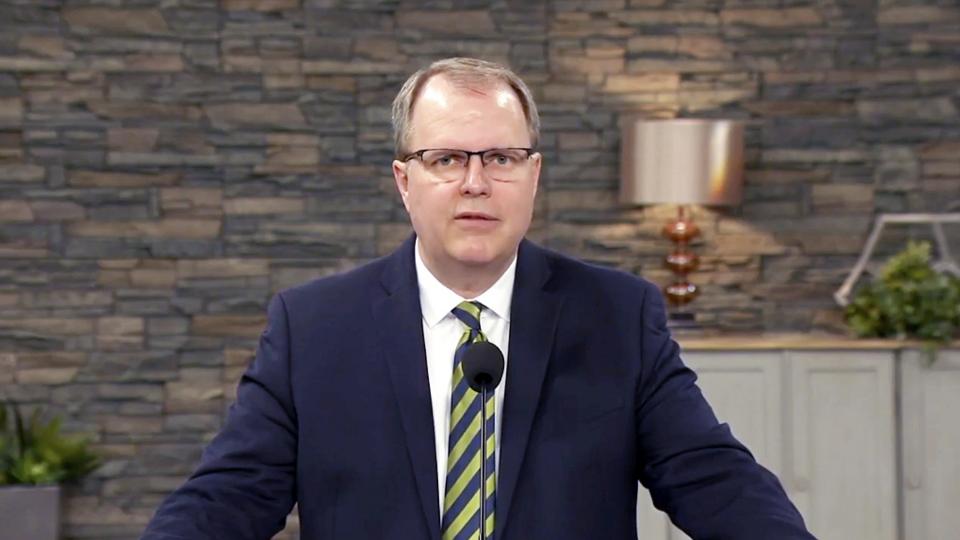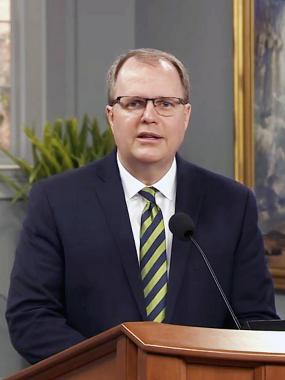
Ashton Ensign College
Brother Brian Ashton teaches Ensign College students during a devotional on May 11, 2021. Photo is a screenshot from the broadcast, courtesy of Church News. 2021 by Intellectual Reserve, Inc. All rights reserved.This story appears here courtesy of TheChurchNews.com. It is not for use by other media.
By Rachel Sterzer Gibson, Church News
Desire is essential to obtaining higher education, taught Brother Brian K. Ashton, vice president of field operations at BYU–Pathway Worldwide, during a May 11 Ensign College devotional.
Desire combined with faith in Jesus Christ can also aid in overcoming a lack of opportunity and “our own doubts and weaknesses,” he said.
Brother Ashton echoed the words of President Russell M. Nelson, who taught that “in the pursuit of education, individual desire is more influential than institution, and personal faith more forceful than faculty.”
The desires that develop during the pursuit of higher education are likely to endure for many years, if not a lifetime. As such, “which desires we develop is critically important, not just because proper desires can help us gain an education and have a fulfilling career, but ultimately because our desires shape what we become and whether we will attain the celestial kingdom,” said Brother Ashton, who previously served as a counselor in the Sunday School general presidency.
Modern and ancient prophets have taught similar truths. President Dallin H. Oaks, first counselor in the First Presidency, said: “Desires dictate our priorities, priorities shape our choices, and choices determine our actions. The desires we act on determine our changing, our achieving and our becoming.”
Several years ago, Brother Ashton purchased an expensive car. Later, he was called as bishop, and a sister in his ward came to see him and told him that she hadn’t eaten in three days.
 Download Photo
Download Photo“My nice car suddenly became an embarrassment to me,” he recalled. “I kept thinking, ‘Why would I spend so much money on a car when those around me, who were just as loved by their Heavenly Father, had so little?’ I have since learned that what brings happiness is not having nice things, but rather serving and helping others.”
The Lord has frequently taught His servants that some desires are better than others. For example, a revelation recorded in the Doctrine and Covenants describes the Savior’s conversation with His Apostles, Peter and John, about their different desires.
Peter asked that when his work was finished that he might “speedily come unto [the Lord] in [His] kingdom,” and John asked for power over death so that he could bring even more souls unto Jesus Christ. The Savior said to Peter, “[your desire] was a good desire; but my beloved has desired that he might do more, or a greater work yet among men than what he has before done” (Doctrine and Covenants 7).
Explained Brother Ashton: “It is this work, helping to bring souls unto Jesus Christ, that will ultimately bring us joy.”
The Lord taught Joseph Smith, Oliver Cowdery and Hyrum Smith that “if we have the proper desires and are willing to work, we can be the means of doing much good among our fellowmen.”
Brother Ashton invited listeners to consider their desires and where these desires might lead. If desires need to be changed, he suggested three ways to do so:
Offering his testimony, Brother Ashton witnessed that “in partnership with the Savior, Jesus Christ, you can make a truly lasting difference in the lives of God’s children if you so desire.”
Copyright 2021 Deseret News Publishing Company